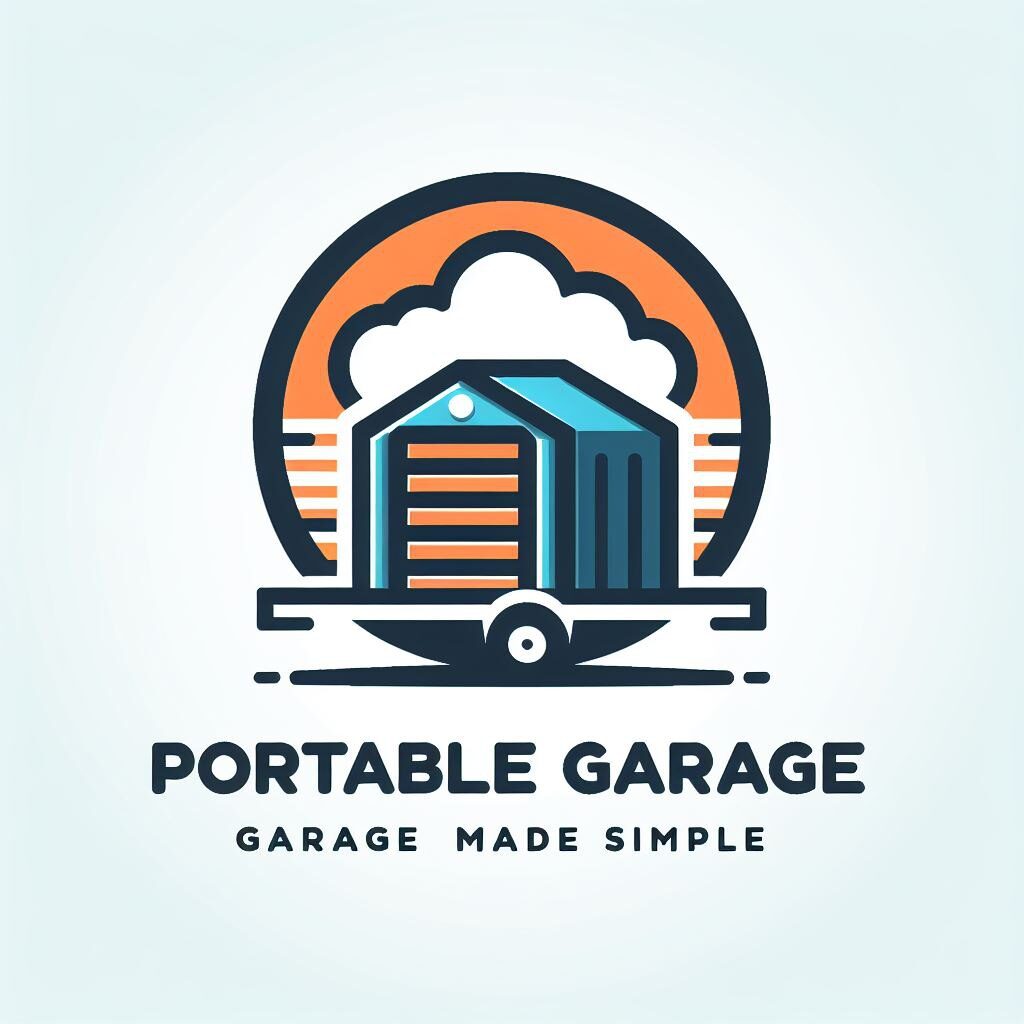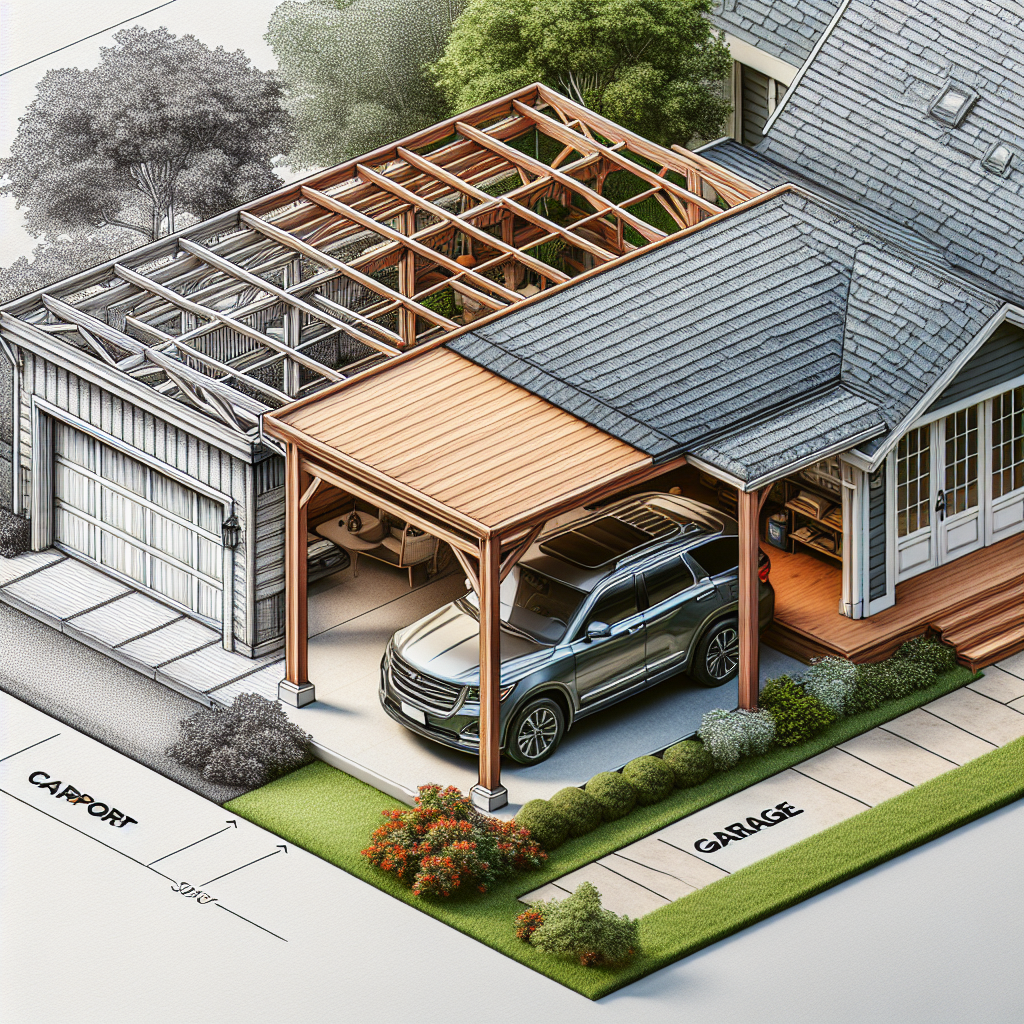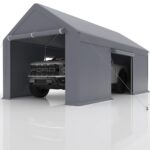Imagine you’re driving home after a long day, and the last thing you want to fuss over is parking your car safely. That’s where carports come in handy. But what exactly is a carport, and how does it differ from a garage? Well, a carport is an open structure with a roof that provides shelter for your vehicle, without the solid walls and doors that a garage has. In this article, we’ll explore the key differences between carports and garages, helping you understand which one might be the perfect fit for your needs. So, let’s get started!
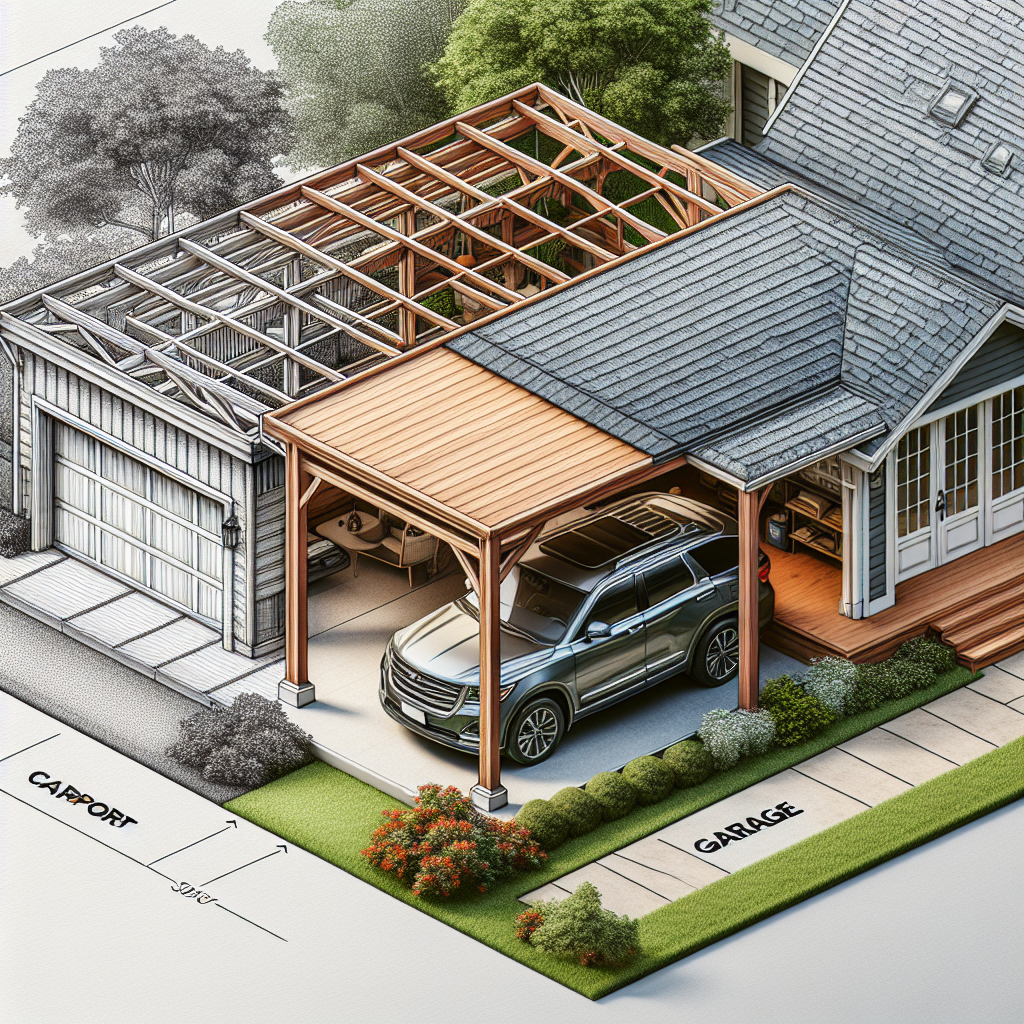
Definition of a Carport
A carport is an open structure that is specifically designed to provide protection for vehicles from weather elements such as rain, snow, and sun. It can be either attached to a building or freestanding, depending on the homeowner’s preference and the available space. Unlike a garage, a carport does not have enclosed walls, providing an open-air parking solution.
Definition of a Garage
A garage, on the other hand, is an enclosed structure that offers complete protection for vehicles from weather elements as well as theft. It can be attached to the main building or detached, depending on the layout and design of the property. With its enclosed walls and often a door, a garage provides secure and weather-resistant parking and storage for vehicles.
Purpose and Functionality
Both carports and garages serve the primary purpose of providing a designated space for parking vehicles and protecting them from outdoor elements. However, there are additional functionalities and benefits offered by each structure.
Carports, due to their open structure, offer versatility and multiple uses. They can be utilized not only for parking cars but also as covered outdoor spaces for gatherings, barbecues, or even as a shaded area for gardening. The open nature of a carport allows for easy accessibility and can accommodate larger vehicles such as RVs or boats.
Garages, with their enclosed structure, provide enhanced security and privacy. Vehicles parked in garages are protected not only from weather elements but also from theft. Garages often have lockable doors, making them an ideal place to store valuable items such as tools, bikes, or recreational equipment. Additionally, garages can be transformed into a workshop or an extra storage space for household items.
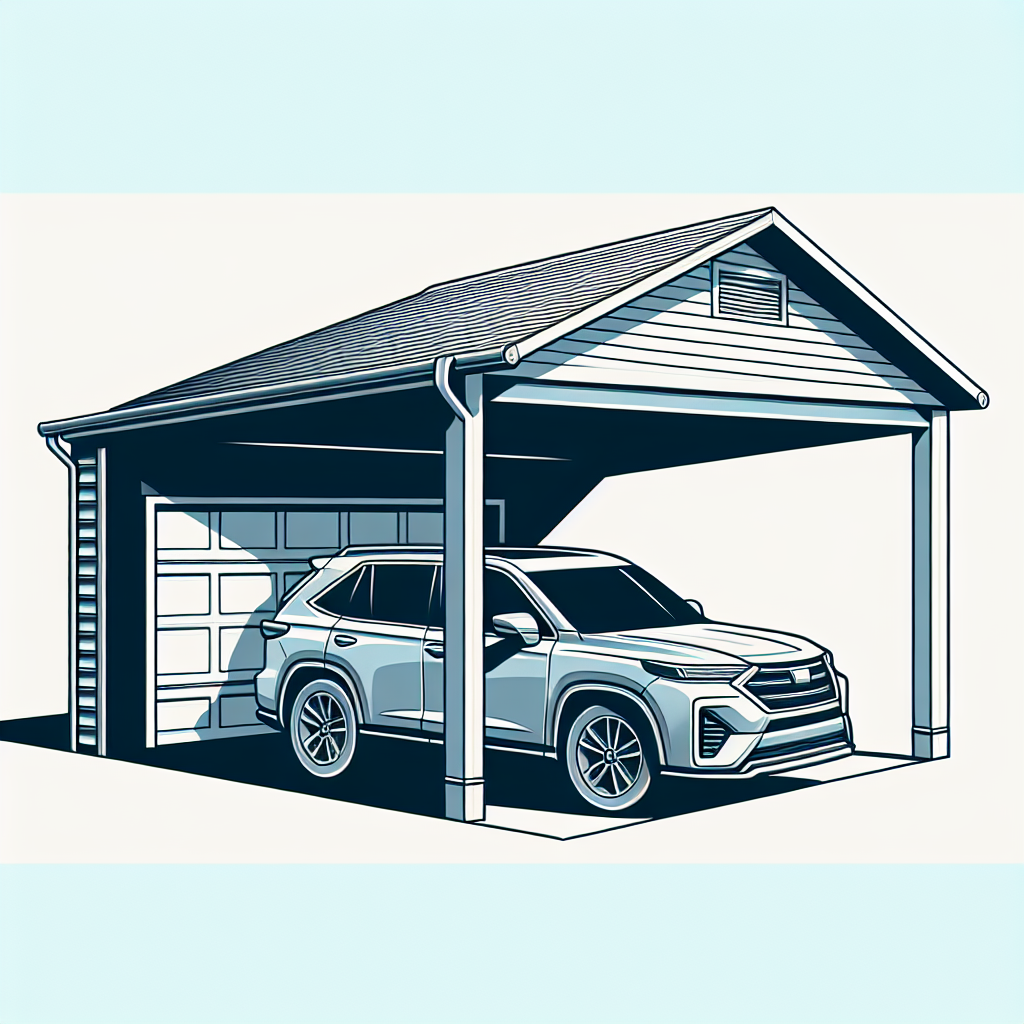
Design and Construction
When it comes to the design and construction of carports and garages, there are several aspects to consider, ranging from materials used to size and dimensions.
Materials used
Carports are typically constructed using materials such as steel, aluminum, or wood. The choice of material depends on factors such as budget, aesthetics, and durability. Steel carports are known for their strength and longevity, while aluminum carports are lightweight and resistant to rust. Wooden carports provide a more traditional and aesthetically pleasing option.
Garages, being enclosed structures, are usually constructed with sturdier materials such as concrete, bricks, or metal. These materials provide better insulation and structural integrity, ensuring the security and durability of the garage.
Roofing options
For carports, roofing options vary from basic coverings such as fabric or metal sheets to more durable materials like shingles or polycarbonate panels. The choice of roofing material primarily depends on the desired level of protection, budget, and aesthetic preferences.
Garage roofs commonly consist of shingles, metal panels, or concrete. These materials provide complete protection from weather elements and are designed to last for an extended period.
Size and dimensions
Carports come in various sizes and dimensions to accommodate different vehicles and spaces. They can be customized to fit the specific requirements of the homeowner, whether it’s a single, double, or even triple carport. The dimensions are determined by the number and size of vehicles to be parked, as well as the available space on the property.
Garages also have flexibility in terms of size and dimensions. They can be built to house one or more vehicles, depending on the homeowner’s needs. Additionally, garages often have extra space for storage or a workshop area, providing versatility and functionality.
Cost Comparison
When considering the cost of installing carports and garages, it is important to evaluate both the initial installation cost as well as the long-term maintenance and repair costs.
Initial installation cost
Carports are generally more affordable than garages due to their simpler structure and minimal materials required. The cost of a carport installation will depend on factors such as the size, material chosen, and any additional features or customization. Generally, carports can be a budget-friendly option for homeowners looking for a practical and cost-effective parking solution.
Garages, with their enclosed structure and additional features, tend to be more expensive to install compared to carports. The cost of a garage installation will depend on factors such as the size, materials chosen, insulation options, and any electrical or plumbing requirements. However, garages provide added value to the property and can be seen as a long-term investment.
Maintenance and repair costs
In terms of maintenance and repair costs, carports typically require less maintenance compared to garages. Carports may need occasional cleaning and inspection to ensure they remain in good condition, but they generally have fewer components that can break or wear out over time. Repairs for carports, if needed, are often less expensive and can be easily performed.
Garages, being more complex structures, may require regular maintenance to ensure their functionality and longevity. This can include maintenance of doors, roofing, and electrical systems. The cost of repairs for garages can vary depending on the extent of the damage or issues that need to be addressed.
Permits and Regulations
Before installing a carport or garage, it is important to be aware of any necessary permits and regulations in your area.
Building permits
In many jurisdictions, the installation of a carport or garage may require a building permit. This is to ensure that the structure complies with local building codes and regulations. It is essential to check with the local building department and obtain the necessary permits before beginning any construction.
Code compliance
Both carports and garages must comply with local building codes and regulations, such as minimum setback requirements, height limitations, and structural requirements. These codes are in place to ensure safety and quality standards are met. It is important to consult with professionals or local building authorities to ensure that the structure meets all necessary code requirements.
Advantages of Carports
Carports offer several advantages that make them a popular choice among homeowners.
Affordability
One of the key advantages of carports is their affordability. As mentioned earlier, carports are generally less expensive to install compared to garages. This makes them an attractive option for homeowners who are on a budget or looking for a cost-effective parking solution.
Easy and faster installation
Installing a carport is often a quicker and simpler process compared to a garage. Carports can be assembled on-site or pre-fabricated, which reduces the construction time significantly. The relatively easy installation process makes carports a convenient choice for homeowners who need a parking solution in a shorter timeframe.
No need for extensive groundwork
Unlike garages, carports typically do not require extensive groundwork such as a concrete foundation. Depending on the size and design, carports can be anchored to the ground or a concrete pad, minimizing the need for excavation or major construction work. This can save time, money, and potential disruptions to the property.
Advantages of Garages
While carports have their advantages, garages offer additional benefits that may suit certain homeowners’ needs.
Enhanced security and privacy
One of the primary advantages of garages is the enhanced security and privacy they provide. With enclosed walls and lockable doors, garages offer superior protection against theft and vandalism compared to carports. The added privacy also prevents prying eyes from seeing your vehicles or any valuable items stored inside.
Protection from all weather conditions
Garages provide comprehensive protection from all weather conditions. Vehicles parked in garages are shielded from rain, snow, hail, and sun damage. The enclosed structure prevents harsh elements from affecting the vehicle’s exterior and interior, ensuring that they remain in good condition for a longer period.
Additional storage and workspace
Garages offer the advantage of additional storage space and the potential for a dedicated workspace. The extra space inside a garage can be utilized to store not only vehicles but also household items, tools, equipment, or even recreational gear. This reduces clutter inside the main living areas and provides a designated space for hobbies, DIY projects, or working on vehicles.
Disadvantages of Carports
While carports have their benefits, there are some drawbacks to consider.
Partial protection from weather
Carports provide only partial protection from weather conditions compared to garages. While they offer shielding from direct sunlight, rain, or snow, carports do not provide the same level of protection and insulation that an enclosed garage does. Vehicles parked in carports may still be exposed to wind-driven rain or snow, though to a lesser extent.
Limited security
Due to their open structure, carports offer limited security compared to garages. Vehicles parked in carports are more accessible and visible, making them potentially more vulnerable to theft or vandalism. While carports can deter casual or opportunistic theft, they may not provide the same level of security as a fully enclosed garage.
No enclosed storage
One major disadvantage of carports is the lack of enclosed storage space. Unlike garages, carports do not provide a secure area to store valuable items or personal belongings. Homeowners who require additional storage space may find the limited storage options of carports a disadvantage.
Disadvantages of Garages
Although garages offer many advantages, there are also some drawbacks worth considering.
Higher installation and maintenance costs
Garages are generally more expensive to install compared to carports. The added cost comes from factors such as the need for enclosed walls, doors, and more durable materials. The initial investment required for a garage might be higher, which may not be feasible for homeowners on a tight budget.
Garages may also require more maintenance compared to carports. This can include periodic checks and repairs of doors, roofing, and electrical systems. The additional complexity of a garage structure may result in higher maintenance costs over time.
Time-consuming construction process
Building a garage can be a time-consuming process compared to installing a carport. The construction of a garage typically involves more detailed planning, foundation work, and the installation of walls, doors, and electrical systems. The longer construction time may not be suitable for homeowners who require a parking solution within a shorter timeframe.
Requires sufficient space
Garages, being fully enclosed structures, require a sufficient amount of space on the property. This can be a disadvantage for homeowners with limited outdoor space or those living in urban areas where land is scarce and expensive. The availability of space should be considered when deciding between a carport and a garage.
In conclusion, both carports and garages offer unique features and benefits. Carports provide an affordable and versatile parking solution, while garages offer enhanced security, protection, and additional storage space. The choice between carports and garages ultimately depends on factors such as budget, space availability, desired functionalities, and personal preferences. Considering the advantages and disadvantages of each structure can help homeowners make an informed decision that suits their specific needs.
